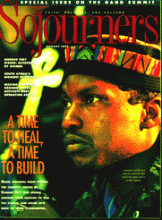Decision making and authority go hand in hand for communities. The style of authority accepted by the group dictates the way decisions will happen. So, for example, if there is an acknowledged leader in the collective, that person will often find him or herself looked to for the final word on tough issues. On the other hand, where a community tries to act on the conviction that the gifts of the Spirit are spread throughout, then consensus in decision making will more than likely take place.
That's speaking on an abstract level. Real life always makes things more complicated, doesn't it? The clear lines just laid out often get blurred in daily living.
That is why reflecting on decision making and authority immediately raises questions. While we can offer opinions on them, it's clear that asking the right questions sheds more light on the issue than simple answers can suggest. Community members, therefore, would do well to stay with these questions for a time.
Given the intensely democratic, individualistic mentality of modern Americans, where does authority fit in community life? Is the only authority ultimately that which is exercised by the collective? Or are there persons in whom authority is legitimately invested?
Our feeling is that while communities frequently confer authority on individuals among their number, the recipient of this responsibility must carry it in as collegial a manner as possible. Furthermore, in particular cases, the community ought to encourage leadership from the member or members who possess the appropriate talent. For example, on many issues the leadership of a woman is entirely more appropriate than that of a man.
Read the Full Article

